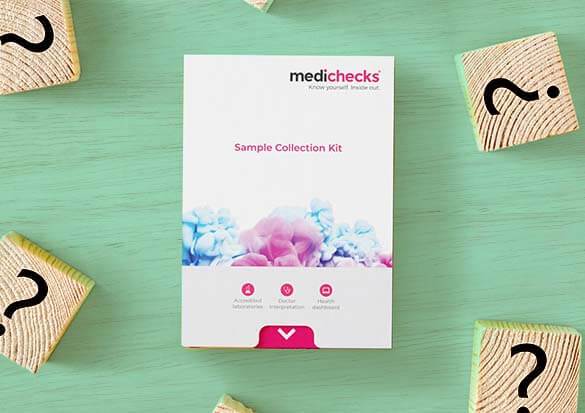What foods are good for thyroid health?
Can the food you eat be good for your thyroid? Find out how a thyroid-friendly diet could affect your thyroid-related symptoms.
If you have a thyroid condition, you may experience symptoms that affect how you feel, your energy levels, or your weight. So, can the food you eat help relieve any of these symptoms and what’s the link between gluten-free diets and thyroid conditions?
We look at whether a particular diet could help you minimise thyroid symptoms.
- How does diet affect your thyroid?
- Foods that are good for thyroid
- Foods that may be bad for your thyroid
- Gluten-free diets and thyroid conditions
- Thyroid blood tests
How does diet affect your thyroid?
Diet plays a significant role in overall health – whether you have a thyroid condition or not. Research is ongoing to understand the exact impact of food and nutrients on thyroid health, but there is some evidence for how specific nutrients affect thyroid function.
For most people with a thyroid condition, medications like levothyroxine are essential. Nevertheless, an appropriate dietary regimen can complement treatment and favour remission by improving thyroid function, as well as regulating levels of T3, T4, and thyroid antibodies. So, let’s look at the science.
What diet should I follow to improve my thyroid health?
1. Eat well – the basics
Starting with a good, solid foundation is always a good idea. While there’s no specific set of diet rules that you should follow, it’s clear that eating a variety of food in the correct proportions is a good start. The Eatwell Guide shows how much of what we eat should come from each food group.
This involves:
- Eating at least five portions of fruit and veg a day
- Choosing unsaturated oils and spreads and eating them in moderation
- Eating some beans, pulses, fish, eggs, meat, and other protein
- Basing meals on high-fibre, wholegrain foods like potatoes, bread, rice or pasta (wholegrain is best)
- Limiting foods high in fat, sugar, and salt
- Drinking plenty of fluids (six to eight glasses a day)
2. Micronutrient intake
Micronutrients are the vitamins and minerals your body needs in small amounts. When you know these micronutrients can benefit your thyroid, you may make you tempted to overindulge in them. So, please remember that a nutrient overload, in some cases, can be just as dangerous as a deficiency. The only way to know if you need more of these vitamins is with a blood test.
Have a look at our Nutrition Blood Tests to see if you’re getting the vitamins and minerals you need.
Micronutrients we cover:
Your thyroid condition might also put you at risk of other deficiencies too. For example, vitamin B12 and vitamin D deficiency are more common in people with hypothyroidism.
Iodine and the thyroid
Iodine is an essential nutrient that is needed to make thyroid hormones, and an iodine deficiency increases the risk of developing hypothyroidism [4]. Iodine supplements are not necessary as it is possible to get enough iodine from your diet alone. If you do not consume many iodine-rich foods, supplements may be a convenient method to top your levels up [5].
By eating seaweed, white fish, dairy, and eggs, you can provide your body with enough iodine for normal thyroid function [6]. Adding iodised table salt to your food will also help to meet your iodine requirements. As government recommendations are to reduce salt intake for health reasons, you should not rely on iodised table salt as a means of increasing your iodine intake.
If you have thyroid disease, are taking other medication, or have experienced iodine deficiency over many years, you should speak to your GP before taking additional iodine. The recommended daily amounts of iodine are 150 mcg/d for adults and 200 mcg/d for pregnant and breastfeeding women (based on the European Food Safety Authority (EFSA) recommendations).
Too little iodine can negatively affect your thyroid health and function and lead to thyroid swelling (a goitre). Foods identified as goitrogenic can interfere with iodine uptake in the thyroid gland and interfere with the synthesis of thyroid hormones.
The verdict: There is reasonable evidence that adequate but not excessive iodine intake is beneficial for thyroid health [7].
Selenium and the thyroid
Selenium is another essential nutrient that the body uses to regulate thyroid hormones. Foods that contain selenium include Brazil nuts, fish, eggs, and meat. The Dietary Reference Values (DRV) for selenium is 60 mcg/d for women and 70 mcg/d for men aged 19-64 [8].
Like iodine, the amount of selenium available through a varied and balanced diet is sufficient, so there’s no need to supplement. Low levels of selenium have been linked with an increased risk of hypothyroidism, goitre, and Hashimoto's thyroiditis [9]. Experts recommend no more than 400 mcg/d of selenium to avoid toxicity, including all sources of food, vitamins, and supplements. Speak to your GP before taking any additional selenium.
The verdict: There is some evidence to suggest that selenium supplementation may be beneficial in Graves’ disease, at least in the short term [10].
Magnesium and the thyroid
Magnesium is involved in almost all of your body’s major cellular metabolic and biochemical processes.
The daily recommended amount of magnesium would once have been easy to obtain from eating green leafy vegetables and meat, but intensive farming has affected the magnesium content of crops. Our fast-paced, modern-day lifestyles may also be to blame for our low magnesium levels as the stress hormones adrenaline and cortisol can deplete the body’s magnesium stores. Alcohol and caffeine act as magnesium diuretics, meaning they can increase the urinary excretion of magnesium from the body.
The verdict: A deficiency can increase the risk of developing autoimmune disorders, including thyroid disease. Correcting low magnesium levels may improve symptoms of Hashimoto’s [11,12].
Zinc and the thyroid
Zinc is an essential nutrient, meaning that the body cannot produce or store zinc alone and needs to consume it daily through diet. Zinc is needed for metabolic function, to produce thyroid hormones, and to regulate TSH [8]. Zinc can increase the levels of thyroid hormone in people with goitres [9].
The recommended daily values for zinc are 9.5 mg and 7.0 mg for men and women, respectively. Zinc is widely available through a varied diet. Good sources of zinc include meat such as chicken and beef, shellfish, bread, dairy, and cereal products.
The verdict: Zinc is needed for thyroid hormone production; therefore, a deficiency may impair thyroid function. Zinc supplementation may help improve thyroid function and hair loss symptoms in hypothyroid patients [13,14].
Iron and the thyroid
Iron is required for several different processes, like creating new red blood cells, carrying oxygen around our body, and strengthening our immune system.
Low levels of iron can lead to a decrease in the oxygen carried around our bodies, eventually leading to iron deficiency anaemia. Similarly, too much iron in our bodies can cause health problems such as iron overload disease.
If you are low in iron, you can try to eat and drink more dark-green leafy vegetables, fortified cereals and bread, meat (if it’s in your diet), and pulses. Eat and drink less tea, coffee, milk and dairy, and food with high levels of phytic acids like wholegrain cereals.
The verdict: Iron deficiency is common in thyroid disease and interferes with the normal functioning of the thyroid, contributing to fatigue and exercise intolerance. In some cases, iron replacement may be necessary [15].
Are anti-inflammatory foods good for your thyroid?
Inflammation is your immune system’s response to injury or infection to remove something that it sees as harmful in some way. While medication and other treatments help manage inflammation, following a diet that focuses on anti-inflammatory foods can further help. Have a read of our blog on foods to control inflammation for more on this.
Due to underlying inflammatory processes with thyroid disease, adopting an anti-inflammatory, largely plant-based, diet is helpful. It’s been shown to likely improve thyroid gland function and reduce the activity of autoantibodies [16].
Foods to eat on an anti-inflammatory diet include:
- Fruit and vegetables that are high in fibre
- Whole grains
- Nuts
- Fish
- Herbs and spices, like turmeric
What food could be bad for my thyroid health?
1. Inflammatory foods
While some foods are good at reducing inflammation, other food may have the reverse effect [16] and are, therefore, best kept to a minimum.
Foods to avoid on an anti-inflammatory diet:
- Refined sugar, such as in sugary drinks and desserts
- Hydrogenated fats, like in butter and fried food
- Red and processed meat
- Alcohol
- Cheese and whole milk
2. Foods that affect the absorption of thyroid medication
There are several foods and supplements which may interfere with or affect the absorption of thyroid medications. These include [17]:
- Calcium supplements (including those found in multivitamins): The exact mechanism is unclear but may involve the adsorption of levothyroxine to calcium, resulting in an insoluble complex that is poorly absorbed. Some experts recommend separating the times of administration by at least four hours.
- Iron supplements: Levothyroxine and ferrous sulfate should not be taken at the same time and products that contain iron may interfere with the effectiveness and absorption of levothyroxine. To avoid this, separate your dosing of these medications by at least two to four hours.
- Coffee: Coffee should precede thyroid medication intake by at least an hour to avoid interaction [7].
- Dietary fibre, walnuts, and calcium-fortified juices: These foods can affect levothyroxine absorption. Avoid these foods within several hours of dosing.
3. Goitrogens
Goitrogens are substances that, when consumed in excess, can interfere with thyroid function. Goitrogens get their name from the term goitre, which is a swelling or enlargement of the thyroid gland. Although large-scale clinical studies in this area are lacking, several studies have highlighted the effects of goitrogenic foods on thyroid function.
There are two main goitrogenic food groups which are cruciferous vegetables and soy products.
Cruciferous vegetables include:
- Cabbage
- Cauliflower
- Broccoli
- Turnips
- Kale
Cruciferous vegetables are very healthy and important to enjoy as part of any healthy balanced diet, so please do not cut them out of your diet completely. The negative effect is likely to be small in comparison to the health benefits. Some evidence has shown they may block the enzyme that allows the thyroid to use iodine, preventing the thyroid from working normally and potentially worsening hypothyroidism. However, it’s unclear how much you would have to eat for this effect to be noticeable [7].
Soy products include:
- Tofu
- Soy sauce
- Edamame
- Tempeh
- Soy nuts
Several studies have found that soy can inhibit thyroid function, possibly through the inhibition of the TPO enzyme [7]. Goitrogenic foods typically lose their thyroid-damaging effect when cooked and are likely only harmful in large quantities. Therefore, the best advice is to avoid eating these foods raw in excess.
Gluten-free diets and thyroid conditions
In patients with Hashimoto’s disease, there is some evidence that a gluten-free diet can reduce levels of thyroid antibodies. However, a gluten-free diet seems to have no effect on restoring normal concentrations of thyroid hormones, and therefore fails to tackle the biggest problem of the disease [3].
Gluten-rich foods may also cause symptoms such as bloating and low energy in some people which are commonly seen with an underactive thyroid. So, reducing gluten intake may help to improve some of these symptoms.
Coeliac disease
Having one autoimmune disorder increases your risk of developing other autoimmune conditions. For example, coeliac disease is much more common in people with autoimmune thyroid disease, affecting up to 3.8% of people compared with 1% in the general population [1]. For these individuals, a gluten-free diet is necessary to prevent inflammation of the gut.
Because many studies have included participants whose coeliac status is unknown, it’s difficult to be certain whether any benefits of a gluten-free diet are related to coeliac disease of thyroid disease.
Should I go gluten-free if I have a thyroid condition?
If you don’t have coeliac disease and a gluten-free diet does not significantly improve your symptoms, it’s probably best to stick to an inclusive, well-balanced diet. Like any other elimination diet, a gluten-free diet can increase your risk of dietary deficiency [3].
Types of Thyroid Blood Tests
Our Thyroid Blood Tests offer you access to the full range of thyroid hormones, thyroid antibodies, and nutrients that can affect thyroid health, together with the added advantage of convenient and speedy service.
- Thyroid Function Blood Test - a comprehensive test that looks for TSH, FT4 and FT3 - the more biologically active form of FT4. This test helps you to take a more in-depth look at your thyroid hormones.
- Thyroid Function with Antibodies Blood Test - with this test, you can tell if your thyroid hormones are functioning within the healthy range. You can also detect any abnormalities caused by an autoimmune disease. Even if your thyroid function is currently normal, elevated antibodies may increase your risk of developing a thyroid disorder in the future.
- Advanced Thyroid Function Blood Test - this test includes the thyroid hormones, thyroid antibodies, and nutritional markers that can support thyroid function. If your nutritional markers are low, this can cause symptoms like a thyroid disorder. For example, low iron (ferritin), low vitamin D and low B vitamins can cause fatigue and low energy.
Unsure which blood test is right for you? Head over to our thyroid buying guide.
References
- Autoimmune thyroid disease [Internet]. Coeliac UK. [cited 2022 Sep 12]. Available from: https://www.coeliac.org.uk/information-and-support/coeliac-disease/conditions-linked-to-coeliac-disease/autoimmune-thyroid-disease/
- Vojdani, A., O'Bryan, T. and Kellermann, G., 2008. The Immunology of Gluten Sensitivity beyond the Intestinal Tract. European Journal of Inflammation, 6(2), pp.49-57.
- Szczuko M, Syrenicz A, Szymkowiak K, Przybylska A, Szczuko U, Pobłocki J, et al. Doubtful Justification of the Gluten-Free Diet in the Course of Hashimoto’s Disease. Nutrients. 2022 Apr 21;14(9):1727.
- Zimmermann, M. and Boelaert, K., 2015. Iodine deficiency and thyroid disorders. The Lancet Diabetes & Endocrinology, 3(4), pp.286-295.
- nhs.uk. 2022. Vitamins and minerals - Iodine. [online] Available at: <https://www.nhs.uk/conditions/vitamins-and-minerals/iodine/> [Accessed 4 March 2022].
- Bda.uk.com. 2022. Iodine Food fact Sheet. [online] Available at: <https://www.bda.uk.com/resource/iodine.html> [Accessed 4 March 2022].
- Babiker A, Alawi A, Al Atawi M, Al Alwan I. The role of micronutrients in thyroid dysfunction. Sudan J Paediatr. 2020;20(1):13–9.
- Assets.publishing.service.gov.uk. 2022. [online] Available at: <https://assets.publishing.service.gov.uk/government/uploads/system/uploads/attachment_data/file/618167/government_dietary_recommendations.pdf> [Accessed 4 March 2022].
- Ventura, M., Melo, M. and Carrilho, F., 2017. Selenium and Thyroid Disease: From Pathophysiology to Treatment. International Journal of Endocrinology, 2017, pp.1-9.
- Zheng H, Wei J, Wang L, Wang Q, Zhao J, Chen S, et al. Effects of Selenium Supplementation on Graves’ Disease: A Systematic Review and Meta-Analysis. Evid Based Complement Alternat Med. 2018;2018:3763565.
- Moncayo R, Moncayo H. The WOMED model of benign thyroid disease: Acquired magnesium deficiency due to physical and psychological stressors relates to dysfunction of oxidative phosphorylation. BBA Clin. 2014 Nov 12;3:44–64.
- Wang K, Wei H, Zhang W, Li Z, Ding L, Yu T, et al. Severely low serum magnesium is associated with increased risks of positive anti-thyroglobulin antibody and hypothyroidism: A cross-sectional study. Sci Rep. 2018 Jul 2;8:9904.
- Maxwell, C. and Volpe, S., 2007. Effect of Zinc Supplementation on Thyroid Hormone Function. Annals of Nutrition and Metabolism, 51(2), pp.188-194.
- Kandhro, G., Kazi, T., Afridi, H., Kazi, N., Baig, J., Arain, M., Sirajuddin, Shah, A., Sarfraz, R., Jamali, M. and Syed, N., 2009. Effect of zinc supplementation on the zinc level in serum and urine and their relation to thyroid hormone profile in male and female goitrous patients. Clinical Nutrition, 28(2), pp.162-168.
- Hu S, Rayman MP. Multiple Nutritional Factors and the Risk of Hashimoto’s Thyroiditis. Thyroid. 2017 May;27(5):597–610.
- 16.Danailova Y, Velikova T, Nikolaev G, Mitova Z, Shinkov A, Gagov H, et al. Nutritional Management of Thyroiditis of Hashimoto. Int J Mol Sci. 2022 May 5;23(9):5144.
- Levothyroxine and Alcohol/Food Interactions [Internet]. Drugs.com. [cited 2022 Sep 21]. Available from: https://www.drugs.com/food-interactions/levothyroxine.html?professional=1
- Mahmoodianfard S, Vafa M, Golgiri F, Khoshniat M, Gohari M, Solati Z, et al. Effects of Zinc and Selenium Supplementation on Thyroid Function in Overweight and Obese Hypothyroid Female Patients: A Randomized Double-Blind Controlled Trial. J Am Coll Nutr. 2015;34(5):391–9.
- Betsy A, Binitha M, Sarita S. Zinc deficiency associated with hypothyroidism: an overlooked cause of severe alopecia. Int J Trichology. 2013 Jan;5(1):40–2.
Related tests
Get detailed insights into your thyroid function, including antibodies and nutrients essential for optimal thyroid health
- Results estimated in 2 working days
- 10 biomarkers
Finger-prick or Venous collection
Select testMonitor your thyroid health and detect any imbalances with our Thyroid Function Blood Test
- Results estimated in 2 working days
- 3 biomarkers
Finger-prick or Venous collection
Select testGet a comprehensive view of your thyroid health with this advanced test with antibodies
- Results estimated in 2 working days
- 5 biomarkers
Finger-prick or Venous collection
Select test




